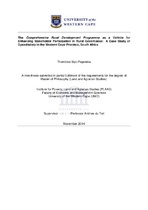| dc.description.abstract | The thesis seeks to investigate the extent to which the Comprehensive Rural Development Programme (CRDP) has succeeded in creating a platform for rural people, including marginalised groups, to be effectively involved in their development. Dysselsdorp was used as a case study in a qualitative approach in order to get an understanding of the experience, views and perceptions of stakeholders, particularly residents and government officials. Data was collected through qualitative research. In-depth interviews were held with relevant government officials, local leaders and ordinary residents and focus groups were held with residents, including local leaders. The research revealed that the involvement of residents in CRDP was limited to needs identification through information giving while needs prioritisation and decisions on implementation were done by government officials. Further, the research suggests that members of the local elite (those who had political connections and social status) captured most of the benefits (i.e. tenders and jobs). Therefore, CRDP in Dysselsdorp had failed to ensure that residents, especially the marginalised, participate fully in their own development. Instead, the status quo remains, where government officials and the elites as representatives of the people make decisions. This corresponds with mere tokenism, as illustrated in Arnstein’s Ladder of Participation Model. A number of factors contributed to the failure to ensure genuine stakeholder participation, including unrealistic expectations of job creation, the assumption of ‘collectivism’, political dynamics in the area and poor institutional design. | en_US |

